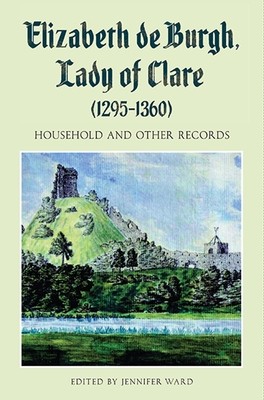
- We will send in 10–14 business days.
- Publisher: Boydell Press
- ISBN-10: 1843838915
- ISBN-13: 9781843838913
- Format: 16.4 x 24.1 x 2.4 cm, kieti viršeliai
- Language: English
- SAVE -10% with code: EXTRA
Elizabeth de Burgh, Lady of Clare (1295-1360) (e-book) (used book) | bookbook.eu
Reviews
Description
Edition, with full explanatory notes and introduction, of financial records from Elizabeth de Burgh, one of the most important women of fourteenth-century England.
Noble widows were powerful figures in the later Middle Ages, running their own estates and exercising considerable influence. Elizabeth de Burgh (1295-1360), daughter of one of the most powerful earls in England and cousin of Edward II, lost her third husband at the age of twenty-six, and spent the rest of her life as a widow. In 1317, having inherited one-third of the lands of her brother, Gilbert de Clare, earl of Gloucester and Hertford, who had been killed at Bannockburn three years earlier, she established herself at Clare, which became her main administrative centre for her estates in East Anglia, Dorset and South Wales. She enjoyed a noble lifestyle, was lavish in her hospitality to family and friends, entertaining Edward III in 1340, and she displayed her piety through her patronage of religious houses and her foundation of Clare College in Cambridge.Her life and activities are portrayed in vivid detail in her household accounts and her will, selected extracts from which are provided in this volume. Altogether, 102 accounts of various types survive from the years of her widowhood, and the records here have been chosento illustrate the great range of information provided, throwing light on Clare castle itself and its furnishings, daily life and religious practice, visitors, food and drink, livery and retainers, travel, and business. They paintof a vivid picture of the life and work of a noble family in the fourteenth century. Jennifer Ward taught and researched medieval and regional history at Goldsmiths College, University of London, until her retirement.
EXTRA 10 % discount with code: EXTRA
The promotion ends in 21d.03:51:23
The discount code is valid when purchasing from 10 €. Discounts do not stack.
- Publisher: Boydell Press
- ISBN-10: 1843838915
- ISBN-13: 9781843838913
- Format: 16.4 x 24.1 x 2.4 cm, kieti viršeliai
- Language: English English
Edition, with full explanatory notes and introduction, of financial records from Elizabeth de Burgh, one of the most important women of fourteenth-century England.
Noble widows were powerful figures in the later Middle Ages, running their own estates and exercising considerable influence. Elizabeth de Burgh (1295-1360), daughter of one of the most powerful earls in England and cousin of Edward II, lost her third husband at the age of twenty-six, and spent the rest of her life as a widow. In 1317, having inherited one-third of the lands of her brother, Gilbert de Clare, earl of Gloucester and Hertford, who had been killed at Bannockburn three years earlier, she established herself at Clare, which became her main administrative centre for her estates in East Anglia, Dorset and South Wales. She enjoyed a noble lifestyle, was lavish in her hospitality to family and friends, entertaining Edward III in 1340, and she displayed her piety through her patronage of religious houses and her foundation of Clare College in Cambridge.Her life and activities are portrayed in vivid detail in her household accounts and her will, selected extracts from which are provided in this volume. Altogether, 102 accounts of various types survive from the years of her widowhood, and the records here have been chosento illustrate the great range of information provided, throwing light on Clare castle itself and its furnishings, daily life and religious practice, visitors, food and drink, livery and retainers, travel, and business. They paintof a vivid picture of the life and work of a noble family in the fourteenth century. Jennifer Ward taught and researched medieval and regional history at Goldsmiths College, University of London, until her retirement.


Reviews